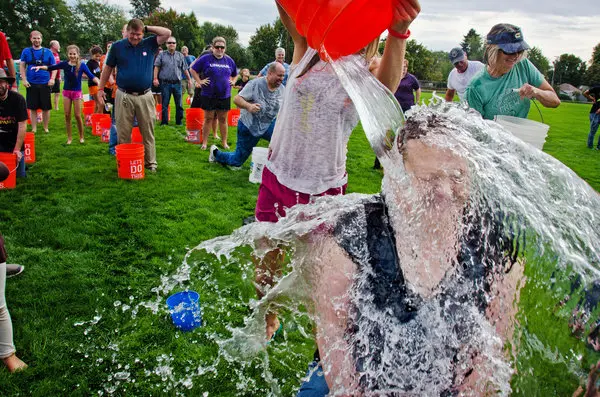Mental Health Ice Bucket Challenge
Break the Silence | End the Stigma | Support the Mind
Introduction
Mental health is the silent epidemic of our time, especially in 2025. There may be hidden emotional pain behind every smile. Regrettably, many individuals remain reluctant to discuss mental health due to feelings of embarrassment, shame, or fear of judgment.
The Mental Health Ice Bucket Challenge is a viral movement that uses cold water as a powerful symbol of emotional pain and the internet as a way to find hope, support, and healing.
What is the Ice Bucket Challenge for Mental Health?
The Mental Health Ice Bucket Challenge started in 2025 as a way to raise awareness around the world. In this challenge:
- Participants immerse themselves in cold water.
- They share a message about mental health.
- They choose three other people to do the same.
The cold water symbolizes the sudden emotional shock, pain, or numbness that millions of people experience when they feel sadness or worry. - Sadness
- Worry
- PTSD
- Bipolar disorder
- Burnout
- Obsessive-compulsive disorder
This is more than just a challenge; it’s a call to make mental health conversations normal, give people a voice, and remind others:
You are not alone.
The goal of the challenge
| Goal | Description |
|---|---|
| Break the Silence | Encourage people to speak about their struggles |
| End the Stigma | Challenge outdated beliefs around mental illness |
| Support One Another | Build a caring and empathetic society |
| Raise Funds | Contribute to mental health services and NGOs |
| Drive Digital Change | Use the internet to create a positive trend |

Emotional Impact
A lot of people have said that the cold water feels like “a moment of shock,” which is similar to the sudden wave of anxiety or panic that someone might feel. This gesture of empathy.
How to Get Involved (Step by Step)
- Please prepare a bucket of cold water, and you may add ice for added effect.
- Make a short video of yourself pouring water over your head.
- Say something important in the video, like
- A fact about mental health
- A word of support
- A personal story (if you’re comfortable)
4. Within 24 hours, choose three people to take on the challenge.
5. Use hashtags to share the video on social media:
- #MentalHealthChallenge
- #MindMatters2025
- #IceBucketForMentalHealth
- #EndTheStigma
Why It Matters in 2025
This is why we need this challenge right now:
Shocking Numbers

- More than 970 million people have mental health problems.
- Only one out of three people gets professional help.
- Suicide is the second most common cause of death for people between the ages of 15 and 29.
- A lot of people suffer in silence because of stigma or cultural taboos.
The challenge gives regular people the strength to speak up, raise awareness, and help others
Mental Health Myths vs Facts
| Myth | Truth |
|---|---|
| Mental illness means you’re weak | It’s a real medical condition |
| Only adults experience mental illness | It affects children, teens, and seniors too |
| Therapy is only for crazy people | Therapy is for anyone who wants to feel better |
| You can just think positive and fix it | Professional help is often required |
| People fake depression for attention | Mental illness is invisible — and very real |
Who is able to take on the challenge?
Anyone. Everybody.
You don’t have to be famous, an expert, or an influencer. This challenge is for:
- Teens who are anxious
- Students who are under a lot of stress from schoolwork
- Parents who are emotionally drained
- Seniors who are lonely
- Office workers who are having difficultrd time but not saying anything
- People who care about everyday things
“Use your voice to lift up someone who doesn’t have one.”
Don't Want to Pour Water? No Problem
- Participation can be a sign. You can still do these things if you can’t or don’t want to use water:
- Share a mental health quote or write a personal story.
- Make posts, reels, or blog posts that raise awareness.
- Give out the phone numbers for helplines in your area.
- Give money to groups that help people with mental health issues.
- Help someone who might be having a hard time right now.

Final Thoughts
The Mental Health Ice Bucket Challenge 2025 isn’t just about water; it’s also about waking people up, speaking out, and giving people who are in pain hope.
“Mental health is health.”
“Struggles are real.” But help is also.
“Speak up, raise your voice, and make a difference.”
Be a part of the movement. Be the voice. Let’s work together to end the stigma.
FAQs : Mental Health Ice Bucket Challenge
1. What does the Mental Health Ice Bucket Challenge aim to do?
The challenge’s goal is to raise awareness about mental health issues like anxiety and depression by having people pour cold water on themselves to show how painful and shocking it can be to go through these things in silence.
2. Is this challenge safe for everyone to do?
Yes, it’s safe for most people. People who have a health problem or are sensitive to cold can still take part by sharing a story, message, or post instead of pouring water.
3. Do I need to make a video to join this challenge?
No. You can also post a photo, a written message, or a voice clip showing your support for mental health, but videos are the best way to raise awareness.
4. Is it possible for me to do the challenge without anyone knowing?
Of course. You can join in without showing your face or name. You don’t have to be in public to get help with your mental health.
5. What should I say in my video for the Ice Bucket Challenge?
You can share a fact about mental health, a word of support, or your own story. For example, “You are not alone.” Mental health is important. “Let’s get rid of the stigma.”
6. Who can I pick to take on this challenge?
Anyone! You can choose friends, family, coworkers, or people who follow you on social media. The goal is to get the word out as far as possible.
7. Is this campaign linked to real mental health groups?
It comes from the ground up, but it can be connected to well-known nonprofits like NAMI, Mind.org.uk, or the Mental Health Foundation.
8. Does this challenge really help people understand mental health?
Yes. It makes things more visible, makes conversations more normal, encourages people to talk about their problems, and may even make someone want to get help from a professional.
9. Is this challenge open to kids and teens?
Yes, but only with an adult present. In fact, getting young people involved helps them learn empathy and how to be aware of their own feelings early on.
10. How can I help mental health without pouring water?
- You can still participate through
- Sharing facts or posts that make people feel good
- Giving money to charities that help people with mental health issues
- Helping someone who is having a hard time
- Promoting resources or helplines